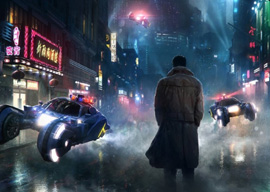
October 11, 2017

Interestingly, virtually all the speaking roles in 2049 are white, although Edward James Olmos returns for a few seconds in his role as The Only Mexican in Los Angeles.
Still, for all its merits, Blade Runner was an overstuffed movie that was hard to digest upon first viewing. When I first saw it in 1982, I emerged with various querulous complaints that seemed increasingly petty as the years went by and its renown rose. Yet watching Blade Runner for a third time this weekend, I started to remember why nobody had made a sequel for 35 years.
Critics love the new film, but audiences (except for men over 25) stayed away during the opening weekend.
The Canadian Gosling has become typecast as Los Angeles Man (Drive, La La Land), although only in The Nice Guys was he allowed to shed the blankness that directors usually demand from him and be entertaining.
In 2049 he plays a replicant racked by unexpected feelings. The camera likes Gosling, but asking him to carry a sequel that’s 45 minutes longer than the first movie is a bridge too far. After all, the initial entry in this series had more or less defeated Harrison Ford at the peak of his career. Ford’s previous two films had been The Empire Strikes Back and Raiders of the Lost Ark, but the public wouldn’t pay to see him in this franchise.
On the other hand, Ford, who shows up as Deckard again in 2049’s third act, is more comfortable in his role than he was in 1982. And nobody asks him to narrate. Ford’s amateurish voice-overs that the studio executives had demanded after screening audiences complained they couldn’t understand the plot nearly wrecked the first movie.
Cameraman Roger Deakins might win his first Oscar after thirteen nominations for Best Cinematography. Hans Zimmer’s monstrous score is not to my taste, but it is formidable. Cuban actress Ana de Armas is gorgeous as Gosling’s holographic girlfriend.
While the first movie was about death (synthetic slave “replicants” rebel against their human creator because they were given only four-year life spans), the second is about birth. LAPD replicant hunter Gosling investigates rumors that Ford and Young had conceived a child in 2021, “a miracle” that inspires the man-made replicants to believe that they have souls and are worthy of self-determination.
The replicants, the ultimate in the deracinated and disposable, want to be part of a lineage, to have children and ancestors, to be a people.
They must, of course, be stopped.